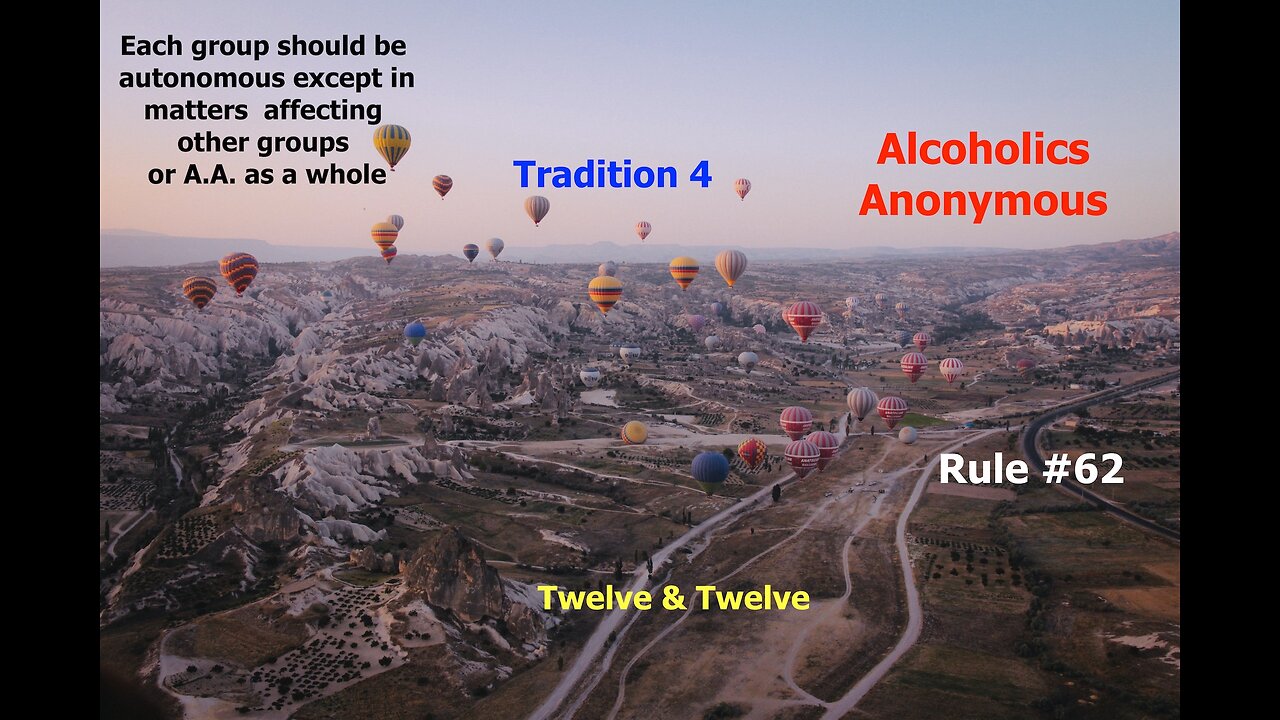Premium Only Content

Tradition 4 - Twelve Steps & Twelve Traditions - Alcoholics Anonymous - Read Along – 12&12 - Rule 62
Tradition 4 - Twelve Steps & Twelve Traditions - Alcoholics Anonymous - 12 & 12 Read Along – We are but Trusted Servants
The Life-Changing Twelve Step Solution to Alcoholism
If you or someone you care about is suffering from addiction, there is help available.
Are you trying to stop drinking?
Do you think you may be an alcoholic?
Alcoholics Anonymous has been successful in saving millions of lives and families.
Local meetings can be found online.
Reach out if you would like assistance.
Spiritual principles helping to live your best life without alcohol and drugs.
Recovery from unhealthy habits and creating solutions for a long happy and useful life.
Alcoholism doesn't have to be a death sentence.
Addiction can be fixed.
Tradition Four
“Each group should be autonomous except in matters affecting other groups or A.A. as a whole.”
AUTONOMY is a ten-dollar word. But in relation to us, it means very simply that every A.A. group can manage its affairs exactly as it pleases, except when A.A. as a whole is threatened. Comes now the same question raised in Tradition One. Isn't such liberty foolishly dangerous?
Over the years, every conceivable deviation from our Twelve Steps and Traditions has been tried. That was sure to be, since we are so largely a band of ego-driven individualists. Children of chaos, we have defiantly played with every brand of fire, only to emerge unharmed and, we think, wiser. These very deviations created a vast process of trial and error which, under the grace of God, has brought us to where we stand today.
When A.A.'s Traditions were first published, in 1946, we had become sure that an A.A. group could stand almost any amount of battering. We saw that the group, exactly like the individual, must eventually conform to whatever tested principles would guarantee survival. We had discovered that there was perfect safety in the process of trial and error. So confident of this had we become that the original statement of A.A. tradition carried this significant sentence: “Any two or three alcoholics gathered together for sobriety may call themselves an A.A. group provided that as a group they have no other affiliation.”
This meant, of course, that we had been given the courage to declare each A.A. group an individual entity, strictly reliant on its own conscience as a guide to action. In charting this enormous expanse of freedom, we found it necessary to post only two storm signals: A group ought not do anything which would greatly injure A.A. as a whole, nor ought it affiliate itself with anything or anybody else. There would be real danger should we commence to call some groups “wet,” others “dry,” still others “Republican” or “Communist,” and yet others “Catholic” or “Protestant” The A.A. group would have to stick to its course or be hopelessly lost. Sobriety had to be its sole objective. In all other respects there was perfect freedom of will and action. Every group had the right to be wrong.
When A.A. was still young, lots of eager groups were forming. In a town we'll call Middleton, a real crackerjack had started up. The townspeople were as hot as firecrackers about it. Stargazing, the elders dreamed of innovations. They figured the town needed a great big alcoholic center, a kind of pilot plant A.A. groups could duplicate everywhere. Beginning on the ground floor there would be a club; in the second story they would sober up drunks and hand them currency for their back debts; the third deck would house an educational project—quite noncontroversial, of course. In imagination the gleaming center was to go up several stories more, but three would do for a start. This would all take a lot of money—other people's money. Believe it or not, wealthy townsfolk bought the idea.
When that lifted, a wonderful thing had happened. The head promoter wrote the Foundation office. He said he wished he'd paid some attention to A.A. experience. Then he did something else that was to become an A.A. classic. It all went on a little card about golf-score size. The cover read: “ Middleton Group #1. Rule #62.” Once the card was unfolded, a single pungent sentence leaped to the eye: “ Don't take yourself too damn seriously.”
Thus it was that under Tradition Four an A.A. group had exercised its right to be wrong. Moreover, it had per- formed a great service for Alcoholics Anonymous, because it had been humbly willing to apply the lessons it learned. It had picked itself up with a laugh and gone on to better things. Even the chief architect, standing in the ruins of his dream, could laugh at himself—and that is the very acme of humility.
-
 LIVE
LIVE
Biscotti-B23
42 minutes ago🔴 LIVE TOURNAMENT PRACTICE ⚔ TOP 100 RANK 👑 DEMON SLAYER HINOKAMI CHRONICLES 2
23 watching -
 LIVE
LIVE
FusedAegisTV
16 hours agoStreet Fighter 6 FINALS, CS2 Semifinals | $1,250,000 | Riyadh, Saudi Arabia EWC 2025 !estv
144 watching -
 40:42
40:42
SouthernbelleReacts
1 day ago $0.10 earned😂 American Pie (1999) Reaction | Iconic Teen Comedy, High School Chaos & 90s Nostalgia 🥧
33.5K4 -
 5:05:02
5:05:02
LumpyPotatoX2
6 hours agoBecome a HellDiver Today - #RumbleGaming
47.8K1 -
 4:52:02
4:52:02
Midnight In The Mountains
8 hours agoGaming w/ PER·SE·VER·ANCE | Sassy Saturday Fortnite | with the Midnights!
35.1K3 -
 6:22:35
6:22:35
shyboyking
6 hours agoThe Bots Of The Bots !!!😎
55.6K2 -
 24:06
24:06
True Crime | Unsolved Cases | Mysterious Stories
5 days ago $0.27 earnedShe Traveled Alone… and Never Came Back – 5 Mysterious Unsolved Cases (Part 6)
38.6K6 -
 27:23
27:23
Clickbait Wasteland
20 hours ago $0.09 earnedAsking New Yorkers Who They Support For Mayor: Staten Island
35.8K20 -
 16:58
16:58
World2Briggs
1 day ago $0.07 earnedThe California Rant: Point Blank With No Fluff or BS. California Gold?
22.6K4 -
 17:49
17:49
Chris Harden
2 days ago $0.04 earnedThe Glass Capital That Shattered | The Decline of Streator, Illinois
16.9K4